genius
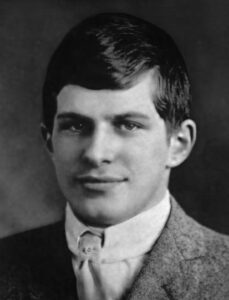
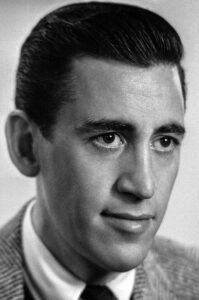 They say that genius can be the closest thing to crazy, but I don’t really know how true that is. Sometimes I think that when a person is a genius, people drive them crazy. It’s the novelty of the thing, I suppose. People find out that the genius has a super high IQ, and they all seem to want something from them. Many people don’t really care about the genius as a person, just about how they might be able to make money off of them somehow. Not every inventor is a genius, but some of them are, as are some mathematicians, doctors, teachers, writers, and many other people too.
They say that genius can be the closest thing to crazy, but I don’t really know how true that is. Sometimes I think that when a person is a genius, people drive them crazy. It’s the novelty of the thing, I suppose. People find out that the genius has a super high IQ, and they all seem to want something from them. Many people don’t really care about the genius as a person, just about how they might be able to make money off of them somehow. Not every inventor is a genius, but some of them are, as are some mathematicians, doctors, teachers, writers, and many other people too.
Sometimes the demands placed on these geniuses gets to be so heavy, that they might just snap. I don’t mean that they might go insane, although some of them have. The thing that seems to happen most, however, is that they might just decide to disappear. Several geniuses have simply vanished, 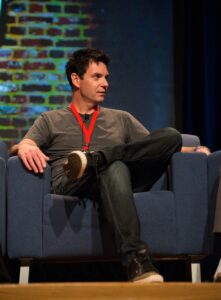 including William Sidis (who graduated from Harvard at 16, only to go into hiding, going from city to city and job to job), JD Salinger (author of Catcher in the Rye, who left Manhattan in 1953 to live on a “90-acre compound” in Cornish, NH. He remained there until his death in 2010, at age 91, saying he loved to write, but publishing was a terrible invasion of his privacy), Ettore Majorana (a theoretical physicist was considered one of the most deeply brilliant men in the world by Enrico Fermi, creator of the first nuclear reactor. One day he drained his bank account and simply vanished), David Thorne (an architect received so much attention for his work on jazz giant Dave Brubeck’s house in 1954, that he changed his professional name in the ‘60s to Beverly Thorne, got an unlisted phone number, and didn’t “resurface” until the 1980s), and Nick Gill (who at 21, was the youngest-ever British chef to win a Michelin star. He seemed destined for a life of fame and fortune and was hailed as a culinary genius. One day he told his brother he was going to disappear, and to “please, not look for him,” never to be seen again).
including William Sidis (who graduated from Harvard at 16, only to go into hiding, going from city to city and job to job), JD Salinger (author of Catcher in the Rye, who left Manhattan in 1953 to live on a “90-acre compound” in Cornish, NH. He remained there until his death in 2010, at age 91, saying he loved to write, but publishing was a terrible invasion of his privacy), Ettore Majorana (a theoretical physicist was considered one of the most deeply brilliant men in the world by Enrico Fermi, creator of the first nuclear reactor. One day he drained his bank account and simply vanished), David Thorne (an architect received so much attention for his work on jazz giant Dave Brubeck’s house in 1954, that he changed his professional name in the ‘60s to Beverly Thorne, got an unlisted phone number, and didn’t “resurface” until the 1980s), and Nick Gill (who at 21, was the youngest-ever British chef to win a Michelin star. He seemed destined for a life of fame and fortune and was hailed as a culinary genius. One day he told his brother he was going to disappear, and to “please, not look for him,” never to be seen again).
It isn’t known, as to why these geniuses would decide that they no longer wanted to be a part of the world, nor 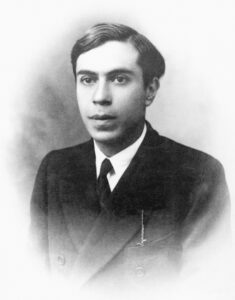
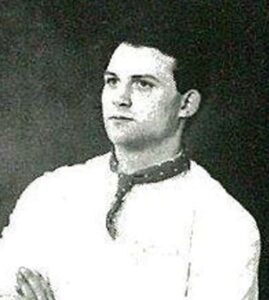 are they to only people to do this by any means. Nevertheless, they seem to have one thing in common, their genius skill or knowledge seemed to take over their whole life, and people wouldn’t leave them alone, but rather hounded them unmercifully. I think I can understand how that would be enough to make someone want to disappear, but most people don’t actually go so far as to take that step. It is a rather extreme step to take, and for all we know some of these might have been killed or committed suicide. The sad reality for these genius minds is that the fame and constant pressure of celebrity was too much for them, and they just checked out, because the burden of knowledge was just too much for them.
are they to only people to do this by any means. Nevertheless, they seem to have one thing in common, their genius skill or knowledge seemed to take over their whole life, and people wouldn’t leave them alone, but rather hounded them unmercifully. I think I can understand how that would be enough to make someone want to disappear, but most people don’t actually go so far as to take that step. It is a rather extreme step to take, and for all we know some of these might have been killed or committed suicide. The sad reality for these genius minds is that the fame and constant pressure of celebrity was too much for them, and they just checked out, because the burden of knowledge was just too much for them.
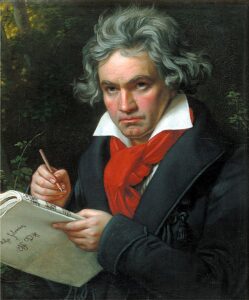 Most people have heard of Ludwig van Beethoven, whether they like his music or not. Most people also know that Beethoven was a deaf musician. I think many people think he was born deaf, but that makes no sense. If he had been born deaf, why would he have ever been interested in music? You really don’t desire to play music that you cannot hear. I don’t think that the mind of a child born deaf would simply have no concept of sound…much less music. Of course, these days, more can be done restore hearing than in Beethoven’s time, but even now, I don’t know if hearing could be restored to someone who was completely deaf from birth.
Most people have heard of Ludwig van Beethoven, whether they like his music or not. Most people also know that Beethoven was a deaf musician. I think many people think he was born deaf, but that makes no sense. If he had been born deaf, why would he have ever been interested in music? You really don’t desire to play music that you cannot hear. I don’t think that the mind of a child born deaf would simply have no concept of sound…much less music. Of course, these days, more can be done restore hearing than in Beethoven’s time, but even now, I don’t know if hearing could be restored to someone who was completely deaf from birth.
As a young man, with normal hearing, Beethoven became interested in music, and proved to be a musical genius. His hearing began to go in his 20s, and I have no doubt that it was a devastating event for him. Imagine being a man with a love of music, suddenly realizing that there will come a day when he can no longer hear the music he loves. Beethoven began to try to figure out a way to continue to have the music he loved, and he came up with a way to play the piano and “hear” the way  his music sounded…vibrations. Vibrations, you say!! Yes!! Beethoven began to experiment on what vibrations occurred when each note was placed. I find that amazing. To be able to distinguish between the vibration B-flat makes as opposed to F-sharp. Any musician can easily tell you which note is which, but could they explain the vibration each one makes. I seriously doubt it.
his music sounded…vibrations. Vibrations, you say!! Yes!! Beethoven began to experiment on what vibrations occurred when each note was placed. I find that amazing. To be able to distinguish between the vibration B-flat makes as opposed to F-sharp. Any musician can easily tell you which note is which, but could they explain the vibration each one makes. I seriously doubt it.
Beethoven not only learned to distinguish the vibrations for each note, but he could quickly put them together in an order that made music that was truly beautiful. No sour notes in his music. No, his music was perfection, but exactly how did he do it. Well, he replicated “hearing” using vibrations by attaching a small rod to the piano and biting down on it while he played. Because our eardrums vibrate from sound, the vibration on Beethoven’s jaw imitated hearing while he was hearing impaired. Totally amazing!! This experiment was the start to the official alternate hearing method called bone conduction. And now you know where some of our greatest innovations in hearing came from.
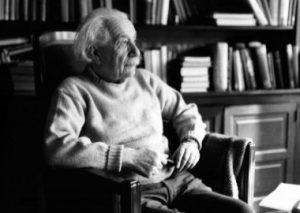 For many years, I have admired Albert Einstein. His mind and his level of intelligence intrigued me, as did his quirkiness. When you think of a genius, your mind automatically produces a picture of a very organized person, who is able to handle any situation, but even geniuses have their issues with things. One well know “weakness” for Einstein was the fact that if something can be written down, it need not take up space in his brain. His brain was very full after all, and clutter was always an issue. That said, if he couldn’t find his train ticket…for the train he took every day from home to work and back…he didn’t know at which stop to get off, because he relied on his ticket to tell him that. I don’t think most of us could even begin to filter our brain in such a way…but Einstein could, and did.
For many years, I have admired Albert Einstein. His mind and his level of intelligence intrigued me, as did his quirkiness. When you think of a genius, your mind automatically produces a picture of a very organized person, who is able to handle any situation, but even geniuses have their issues with things. One well know “weakness” for Einstein was the fact that if something can be written down, it need not take up space in his brain. His brain was very full after all, and clutter was always an issue. That said, if he couldn’t find his train ticket…for the train he took every day from home to work and back…he didn’t know at which stop to get off, because he relied on his ticket to tell him that. I don’t think most of us could even begin to filter our brain in such a way…but Einstein could, and did.
Einstein was a gifted scientist and mathematician. He was most famous for his theory of relativity and the resulting formula relating mass and energy…E = MC². He was the winner of 1921 Nobel Prize in physics for his work on the photoelectric effect, which is also known as the Hertz effect. Einstein was born in Ulm, in the Kingdom of Württemberg in the German Empire, on March 14, 1879. His parents were Hermann Einstein, a salesman and engineer, and Pauline Koch. He didn’t feel the need to celebrate his birthday,saying “It is a known fact that I was born, and that is all that is necessary.” Friends, colleagues and complete strangers still felt the need to send telegrams, cards, letters, gifts, and an elaborate birthday cake.
Being a Jewish man, circumstances in Germany became life threatening for Einstein in the early 1930s, so early in 1933, while on a trip to the United States, he knew he could not go home again, so he moved permanently  to the United States, and worked at Princeton University…a career that would take him to the end of his life on April 18, 1955. Einstein could have been saved, but when he was asked if he wanted to undergo surgery, he refused, saying, “I want to go when I want to go. It is tasteless to prolong life artificially. I have done my share; it is time to go. I will do it elegantly.” After an autopsy, Einstein’s body was cremated and his ashes spread in an undisclosed location.
to the United States, and worked at Princeton University…a career that would take him to the end of his life on April 18, 1955. Einstein could have been saved, but when he was asked if he wanted to undergo surgery, he refused, saying, “I want to go when I want to go. It is tasteless to prolong life artificially. I have done my share; it is time to go. I will do it elegantly.” After an autopsy, Einstein’s body was cremated and his ashes spread in an undisclosed location.
After his passing, another of the multiple quirky aspects of Einstein’s personality came to light when LIFE magazine wrote about a famous picture taken in Albert Einstein’s Princeton office. Einstein’s desk was just as he left it. Here, the picture says, is where Einstein worked, dreamed, lived his singular, principled life to its fullest. “When I was young, all I wanted and expected from life was to sit quietly in some corner doing my work without the public paying attention to me,” said Einstein after being honored at a social function. “And now see what has become of me.”
When I look and Einstein’s desk, it takes me back to the many times my own desk has looked exactly like that. It is another way that the famed scientific and mathematical genius and I are alike. Now, I do not claim to have the IQ of this man, but we do have a few things in common, and the ability to work on top of a stack of papers seems to be one of them. Maybe that and the ability to somewhat filter things out of my mind if they are stored in my phone which could be the same thing as filtering because I have it written down. And because of my shy side, I suppose I can understand his concern over public attention, and yet knowing that sometimes it can’t be helped. When I look at his desk, I can see a man whose mind was fill with many thoughts, making it easy to  lose himself in his thoughts to the point of seeming to ignore those around him. Those who met Einstein recalled his human side. He “walked to work or rode the bus in bad weather; visited the neighbors’ newborn kittens; greeted carolers on winter nights; refused to update his eyeglass prescription; and declined to wear socks because they would get holes in them. But he didn’t seem to mind fuzzy slippers!” He was his own man with his own ideas, and if those ideas didn’t make sense to those around him, it was simply not his problem. On April 18, 1955, Albert Einstein died soon after a blood vessel burst near his heart. The world mourned Einstein’s death, but true to form, at his request, his office and house were not turned into memorials.
lose himself in his thoughts to the point of seeming to ignore those around him. Those who met Einstein recalled his human side. He “walked to work or rode the bus in bad weather; visited the neighbors’ newborn kittens; greeted carolers on winter nights; refused to update his eyeglass prescription; and declined to wear socks because they would get holes in them. But he didn’t seem to mind fuzzy slippers!” He was his own man with his own ideas, and if those ideas didn’t make sense to those around him, it was simply not his problem. On April 18, 1955, Albert Einstein died soon after a blood vessel burst near his heart. The world mourned Einstein’s death, but true to form, at his request, his office and house were not turned into memorials.
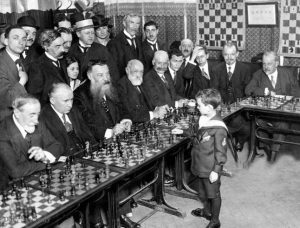 Mastery knows no age. Genius can occur in anyone, and of course, always presents itself when a child is very young. In 1920, one such genius, Samuel Reshevsky was busy mastering chess masters in France. Reshevsky learned chess when he was just 4 years old. He became known as a child chess prodigy and was playing simultaneous games of chess against adults when he was 6 years of age. At age 8 he was playing chess against strong players. Following the events of World War 1, Reshevsky immigrated to the United States. As a 9 year old, his first American simultaneous exhibition was with 20 officers and cadets at the Military Academy at West Point. He won 19 games and drew one. He toured the country and played over 1,500 games as a 9 year old in simultaneous exhibitions and only lost 8 games. In his early years he did not go to school and his parents ended up in Manhattan Children’s Court on charges of improper guardianship. In reality, little Samuel probably could have taught the teachers, so missing some of his education was not detrimental to him in any way.
Mastery knows no age. Genius can occur in anyone, and of course, always presents itself when a child is very young. In 1920, one such genius, Samuel Reshevsky was busy mastering chess masters in France. Reshevsky learned chess when he was just 4 years old. He became known as a child chess prodigy and was playing simultaneous games of chess against adults when he was 6 years of age. At age 8 he was playing chess against strong players. Following the events of World War 1, Reshevsky immigrated to the United States. As a 9 year old, his first American simultaneous exhibition was with 20 officers and cadets at the Military Academy at West Point. He won 19 games and drew one. He toured the country and played over 1,500 games as a 9 year old in simultaneous exhibitions and only lost 8 games. In his early years he did not go to school and his parents ended up in Manhattan Children’s Court on charges of improper guardianship. In reality, little Samuel probably could have taught the teachers, so missing some of his education was not detrimental to him in any way.
Reshevsky was a tough and forceful player who was superb at positional play, but could also play brilliant 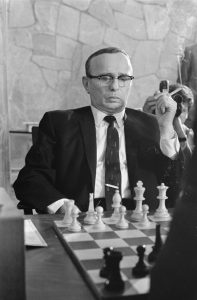 tactical chess when warranted. He often used huge amounts of time in the opening, a dangerous tactic which sometimes forced him to play the rest of the game in a very short amount of time. That sometimes unsettled Reshevsky’s opponents, but at other times resulted in blunders on his part. Reshevsky’s inadequate study of the opening and his related tendency to fall into time-pressure may have been the reasons that, despite his great talent, he never became world champion; he himself acknowledged this in his book on chess upsets.
tactical chess when warranted. He often used huge amounts of time in the opening, a dangerous tactic which sometimes forced him to play the rest of the game in a very short amount of time. That sometimes unsettled Reshevsky’s opponents, but at other times resulted in blunders on his part. Reshevsky’s inadequate study of the opening and his related tendency to fall into time-pressure may have been the reasons that, despite his great talent, he never became world champion; he himself acknowledged this in his book on chess upsets.
Reshevsky never became a truly professional chess player. He gave up competitive chess for seven years, from 1924 to 1931, to complete his secondary education. He graduated from the University of Chicago in 1934 with a degree in accounting, and supported himself and his family by working as an accountant. Not everyone could leave off and then pick up their education and never miss a beat. Of course, when you have genius level intelligence, I guess that isn’t a problem.
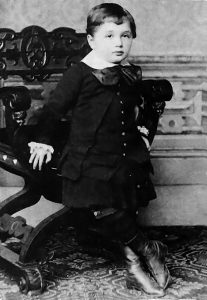
 Of the great minds that have lived, I think I like Albert Einstein the best. I suppose some people would disagree with me, but each person relates differently to people, than other people do. I wish I could have met Einstein, because I think we think a lot alike. Of course, I don’t claim to have anywhere near the level of IQ that he had, but I do see some similarities in how we think. We both had the tendency to think that if something can be written down, or in my case stored in my iPhone, then I don’t need to store it in my mind too.
Of the great minds that have lived, I think I like Albert Einstein the best. I suppose some people would disagree with me, but each person relates differently to people, than other people do. I wish I could have met Einstein, because I think we think a lot alike. Of course, I don’t claim to have anywhere near the level of IQ that he had, but I do see some similarities in how we think. We both had the tendency to think that if something can be written down, or in my case stored in my iPhone, then I don’t need to store it in my mind too.
For Einstein, who was a genius, not storing information in his head became a bit of a problem once, when he misplaced the train ticket he had just purchased. When the conductor came by to take his ticket, a frantic Einstein searched unsuccessfully for his ticket. Seeing that he was obviously very upset by this occurrence, the conductor told him, “It’s alright, Mr Einstein, I saw you buy your ticket.” Einstein, still highly upset, said, “It may be alright with you, but if I don’t find my ticket, I don’t know where to get off!” That must have shocked the conductor, because he knew that Albert Einstein rode the same train to and from work every day. Of course, many things are different these days, and I don’t ride a train, plus I’m quite good at navigation, so I don’t see myself not knowing where to get off or to turn, in my case, but it was a real problem to Albert Einstein. It was also an incident that I found amusing, given the mind this man had. Einstein is said to have had an IQ of between 160 and 190, and while I have not been tested, I am quite sure that my IQ is not as high as Einstein’s was, by any stretch of the imagination.
I do know that Einstein had the ability to understand things that would boggle the minds of most people. “Einstein showed that absolute time had to be replaced by a new absolute: the speed of light. Einstein went against the grain and totally dismissed the “Old Physics.” He envisioned a world where space and time are 
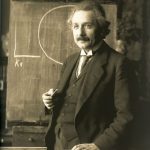 relative and the speed of light is absolute. Prior to that time, it was believed that space and time were absolute and the speed of light was relative. In 1921, Albert Einstein was awarded the Nobel Prize in Physics “for his services to theoretical physics and especially for his discovery of the law of the photoelectric effect”. In 1925, he was awarded the Copley Medal by the Royal Society, which is perhaps the oldest surviving scientific award in the world. Einstein’s mind was so interesting to me, but to him, it was just normal.
relative and the speed of light is absolute. Prior to that time, it was believed that space and time were absolute and the speed of light was relative. In 1921, Albert Einstein was awarded the Nobel Prize in Physics “for his services to theoretical physics and especially for his discovery of the law of the photoelectric effect”. In 1925, he was awarded the Copley Medal by the Royal Society, which is perhaps the oldest surviving scientific award in the world. Einstein’s mind was so interesting to me, but to him, it was just normal.
 My sister, Alena and her husband, Mike have been planning some renovations and upgrades on their bathroom. They have been planning this project for a while now, but they weren’t ready to begin just yet. The plan was to renovate the bathroom during the summer when they have a little more time. Unfortunately, the best laid plans sometimes go awry, and that is exactly what happened in this case. The bathroom had a different idea. In November, the pipes sprung a leak. To repair the pipe leak when they were going to have to remove the repaired area again so soon seemed like such a waste of time and money.
My sister, Alena and her husband, Mike have been planning some renovations and upgrades on their bathroom. They have been planning this project for a while now, but they weren’t ready to begin just yet. The plan was to renovate the bathroom during the summer when they have a little more time. Unfortunately, the best laid plans sometimes go awry, and that is exactly what happened in this case. The bathroom had a different idea. In November, the pipes sprung a leak. To repair the pipe leak when they were going to have to remove the repaired area again so soon seemed like such a waste of time and money.
At his point many people would have resigned themselves to what seemed the inevitable, but not my brother-in-law, Mike. He has always been a problem solver, and is used to having to make repairs to different things on the spur of the moment. Sometimes, that means rigging things to make the repair, using unconventional methods and unconventional parts.
Mike set out to make a temporary repair to the broken pipe. He cut the bottom and top out of a couple of beer cans. Then he cut the side of the can and wrapped it around the pipe. Then Mike put a layer of silicone to make sure there would be no leaks. Then he used tie straps to hold the cans in place. The idea worked, and the repairs held…and they held until now, when they are ready to do the remodeling!! The seemingly  inevitable costly repairs were avoided.
inevitable costly repairs were avoided.
Now, if you ask his kids, the repairs were…original to say the least. In fact, one of his daughters, Lacey said, “Can you say Redneck?” We both laughed about that one, and I guess she or one of her siblings, Michelle or Garrett must have also mentioned the word Redneck, because Alena quickly came to Mikes rescue when she said, “You might call it Redneck, but I call it Genius!” While the repairs to look unconventional, I would have to agree with Alena, it is pretty genius. Another job well done and it didn’t cost a dime. Today is Mike’s birthday. Happy birthday Mike!! Have a great day!! We love you!!

